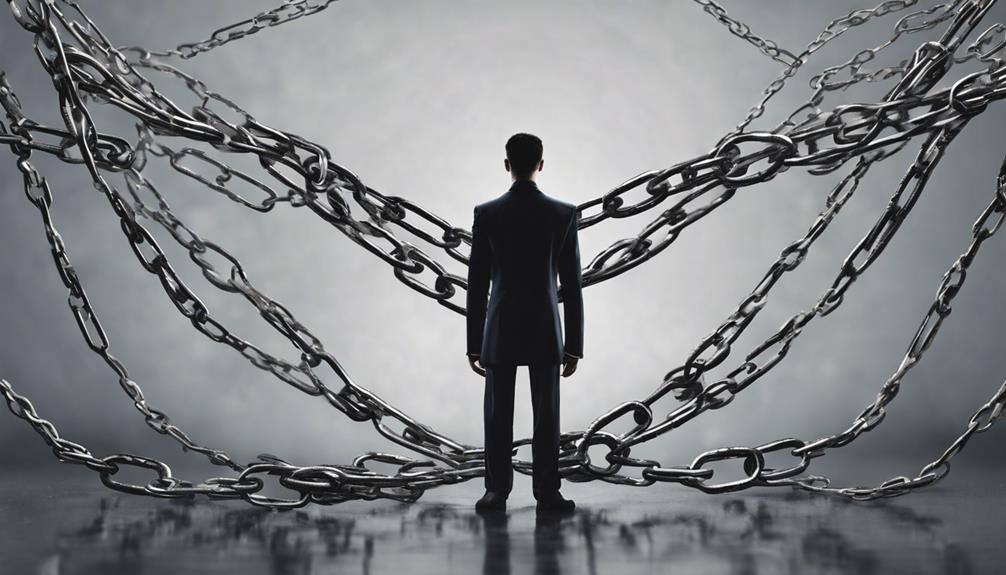As we navigate the complexities of relationships, something we may not realize is how narcissists utilize triangulation tactics to manipulate and control those around them. The subtle yet powerful ways in which they sow seeds of doubt and create divisions can leave us questioning our own worth and sanity.
Understanding these tactics is crucial in safeguarding our emotional well-being and regaining a sense of autonomy. Stay tuned to uncover the insidious methods narcissists employ in triangulation, and discover how we can protect ourselves from falling prey to their destructive games.
Key Takeaways
- Recognize and break free from narcissist triangulation to regain control of your emotions.
- Refuse to engage in triangulation games to show that it is not a healthy dynamic.
- Understand that narcissists triangulate to boost their ego and maintain control over others.
- Focus on healing yourself from the gaslighting effects of narcissistic triangulation tactics.
Triangulation: A Manipulative Control Tactic
Triangulation, a cunning manipulation tactic employed by narcissists, involves pitting individuals against each other to assert control and fuel their insatiable need for admiration and dominance. This insidious strategy aims to create a web of confusion and competition, where the narcissist orchestrates scenarios to maintain power over those entangled in the triangle.
By fostering distrust and insecurity between individuals, the narcissist thrives on the attention and validation garnered from the ensuing drama. Understanding this tactic is crucial in breaking free from its grip and reclaiming autonomy. Recognizing the signs of triangulation and stepping away from the toxic dynamic are vital steps in dismantling the narcissist's control.
It's essential to prioritize self-care and set boundaries to safeguard against further manipulation.
Understanding Narcissist's Divide and Conquer Strategy

Understanding the narcissist's divide and conquer strategy reveals their calculated approach to manipulating relationships and maintaining control over those within their sphere of influence. This tactic involves creating conflict and competition between individuals to weaken their bonds and assert dominance.
By turning one person against another, the narcissist can foster feelings of insecurity, mistrust, and isolation among their targets. This strategy serves to ensure that the narcissist remains at the center of attention and power, orchestrating situations to suit their agenda.
Recognizing this insidious behavior is crucial in protecting oneself from falling victim to their divisive tactics and reclaiming personal autonomy within relationships tainted by narcissistic influence.
Recognizing Narcissist Triangulation Patterns
By observing subtle shifts in behavior and communication dynamics, we can begin to recognize the insidious patterns of narcissist triangulation in our relationships. These patterns often manifest as a constant need for validation, manipulation through comparison and competition, and a sense of being used as pawns in a game of emotional control.
As we tune into these red flags, we may notice how the narcissist strategically brings in a third party to destabilize our sense of self-worth and sow seeds of doubt within us. Paying attention to these tactics can help us untangle ourselves from the web of manipulation and regain our autonomy.
It's essential to trust our instincts and seek support from trusted individuals to navigate these challenging dynamics.
Reacting: Breaking Free From Triangulation

Breaking free from the toxic cycle of narcissistic triangulation requires a conscious effort to recognize and disengage from manipulative dynamics. It's essential to acknowledge the signs of manipulation and prioritize your well-being.
By stepping away from the narcissist and focusing on self-healing, you can break the hold of the toxic triangle. Refusing to give the narcissist the attention they crave disrupts their control, empowering you to regain your autonomy.
Unveiling Tactics: Creating Doubt and Worthlessness
To unravel the insidious tactics employed by narcissists, we must confront the distressing reality of how they sow seeds of doubt and worthlessness in their manipulated victims. This insidious behavior aims to break down self-esteem and foster dependency, keeping victims under the narcissist's control. In this toxic dynamic, the narcissist strategically employs various tactics to create an environment of uncertainty and inadequacy, leaving the victims emotionally vulnerable and easily manipulated.
- Gaslighting techniques to distort reality and undermine self-trust.
- Constant criticism and belittlement to erode self-worth.
- Comparisons to others to instill feelings of inferiority.
- Withholding affection and validation to reinforce a sense of unworthiness.
Examples: How Narcissists Use Triangulation

In examining how narcissists utilize triangulation, a clear pattern of manipulation and emotional control emerges.
For instance, a narcissist might compare their current partner to an ex-partner, intentionally triggering jealousy and insecurity. Another tactic involves flirting with others in front of their partner to create feelings of inadequacy. Sometimes, the narcissist may even use pets or objects to manipulate emotions, further solidifying their control over the manipulated parties.
These calculated actions serve to boost the narcissist's ego and maintain dominance in the relationship dynamic.
Understanding these examples sheds light on the insidious ways in which narcissists employ triangulation to fulfill their need for adoration and control, at the expense of others' emotional well-being.
Impact: Toxicity of Narcissist Triangulation

Understanding the detrimental effects of narcissist triangulation is crucial in recognizing the toxic dynamics it creates within relationships. The impact of such manipulation can be profound and long-lasting:
- Emotional turmoil and confusion reign in manipulated individuals.
- Trust and self-esteem are eroded, leaving scars that may take time to heal.
- Constant comparison and competition breed feelings of inadequacy and unworthiness.
- The web of deceit and manipulation isolates individuals, making them question their reality and worth.
These effects can linger far beyond the immediate situation, affecting future relationships and one's sense of self. Recognizing and breaking free from this toxic cycle is vital for reclaiming one's emotional well-being and autonomy.
Frequently Asked Questions
How Can One Rebuild Their Self-Esteem and Confidence After Experiencing Narcissist Triangulation?
We can rebuild self-esteem and confidence after facing narcissist triangulation by recognizing our worth, seeking support, setting boundaries, and focusing on self-care. Refusing to engage in toxic dynamics and prioritizing our well-being are crucial steps in healing.
Are There Any Long-Term Effects on Mental Health From Being Exposed to Narcissist Triangulation?
Experiencing narcissist triangulation can lead to lasting mental health effects. Our self-worth may suffer, and trust in relationships can be damaged. Recognizing these impacts is the first step towards healing and rebuilding resilience.
Can Narcissist Triangulation Occur in a Work or Professional Setting, and if So, How Can It Be Identified and Addressed?
In a professional setting, narcissist triangulation can damage team cohesion and productivity. It's crucial to recognize manipulative tactics early, step back, and focus on healing. Refusing to engage disrupts their control and fosters a healthier work environment.
What Are Some Strategies for Setting Boundaries With a Narcissist Who Uses Triangulation Tactics?
Recognizing triangulation, we step back to safeguard our emotional well-being. Setting firm boundaries is essential. We prioritize self-care and refuse to feed into manipulative games, asserting our autonomy and worth. Healing begins with self-preservation.
Is There a Difference in How Men and Women Experience and Respond to Narcissist Triangulation in Relationships?
Navigating narcissist triangulation can be like dancing on eggshells. Men and women both experience the toxic game differently but share the need for self-preservation. Recognize the manipulation, step away, and prioritize healing to break free.
Conclusion
In conclusion, understanding the tactics of narcissist triangulation is crucial in protecting ourselves from emotional manipulation.
One shocking statistic reveals that 70% of individuals who've experienced narcissistic triangulation report feeling a sense of worthlessness and self-doubt.
By recognizing these patterns and taking proactive steps to break free from their control, we can reclaim our autonomy and heal from the toxic effects of narcissistic manipulation.
Stay informed, stay empowered, and prioritize your well-being.









